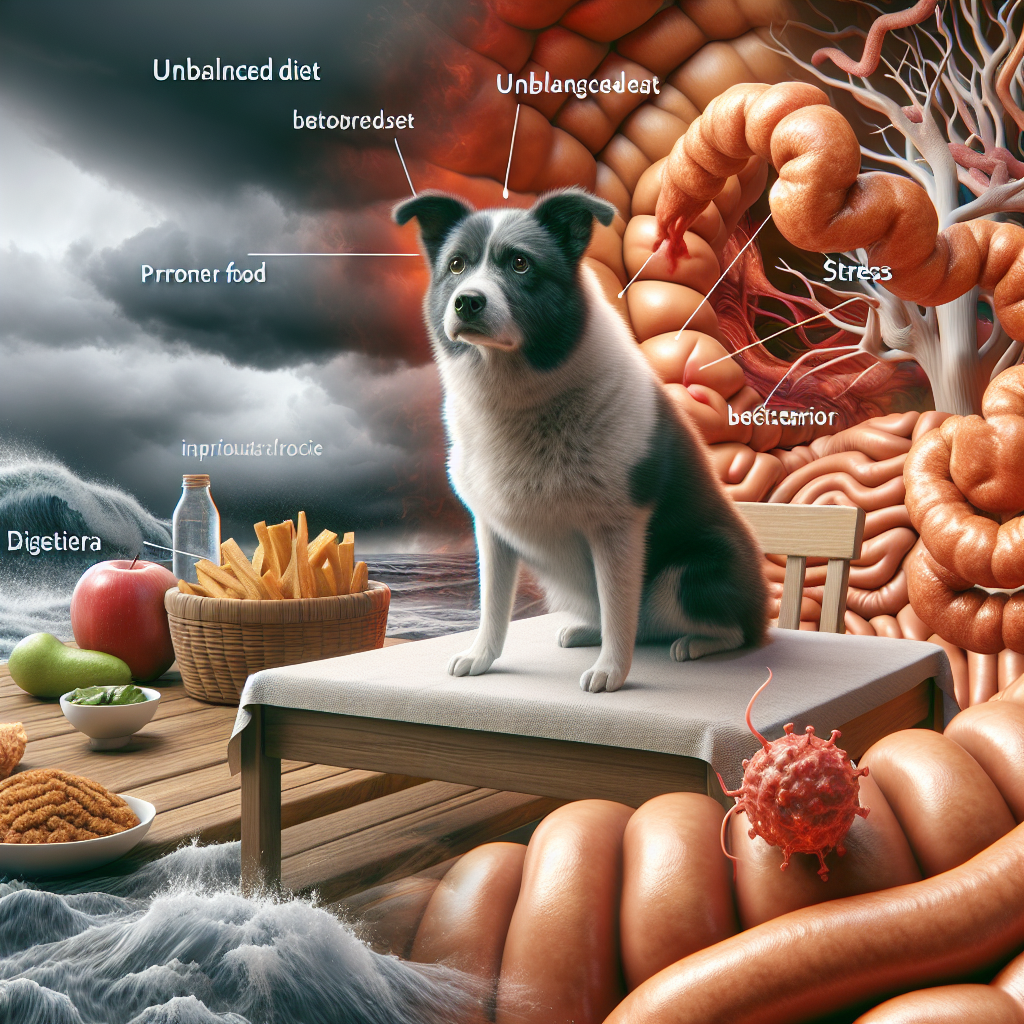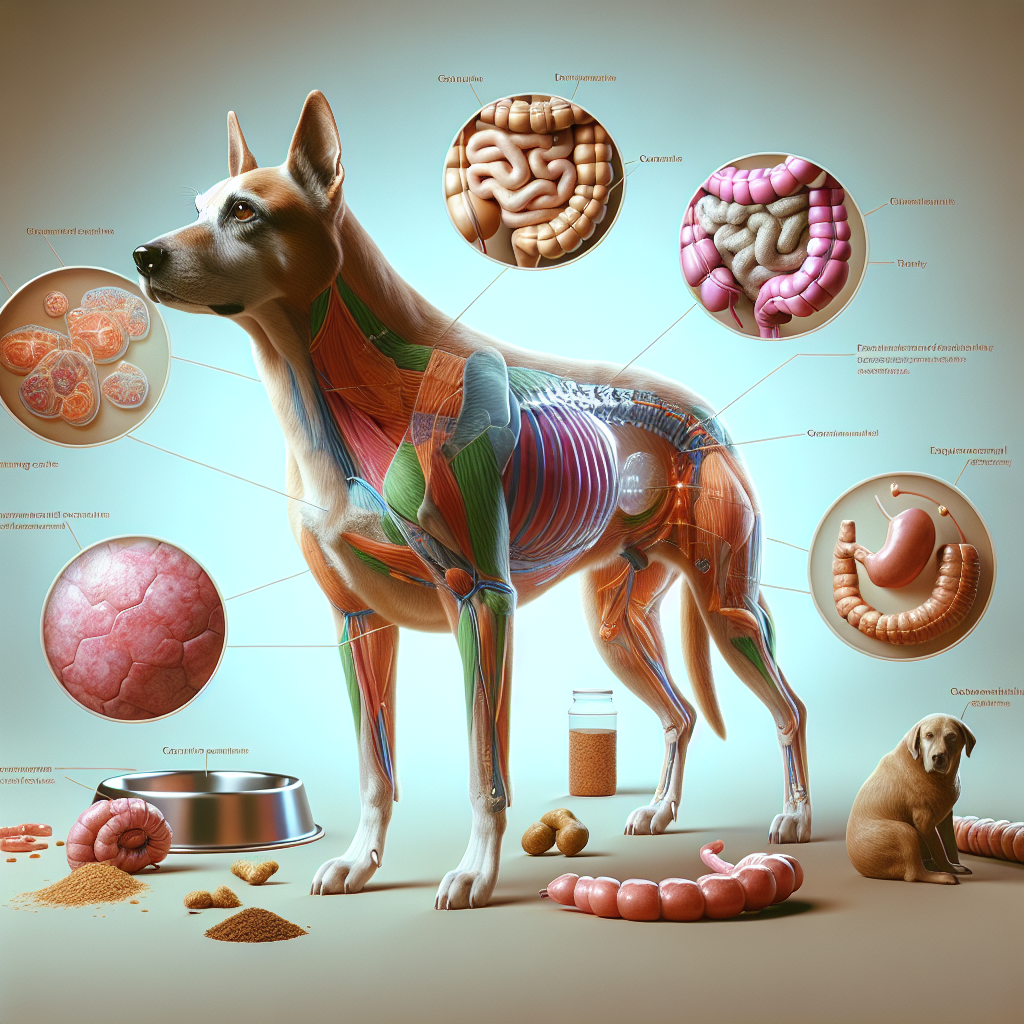Understanding Botulism in Dogs
Botulism is a rare but serious condition that can affect dogs. It is caused by the ingestion of the botulinum toxin produced by the bacteria Clostridium botulinum. Dogs typically contract botulism by consuming dead animals or contaminated raw meat, allowing the toxin to be absorbed by the intestines, enter the bloodstream, and bind to nerve cells, leading to paralysis (VCA Hospitals).
The main causes of botulism in dogs can be summarized as follows:
Causes of Botulism
- Ingesting the botulinum toxin produced by Clostridium botulinum bacteria
- Consumption of dead animals contaminated with the toxin
- Eating contaminated raw meat or decomposing animal tissue
- In some cases, dead iguanas have been implicated as a source of botulism, particularly in South Florida where they may fall from tall trees during colder weather (Southeast Veterinary Neurology)
It’s important to note that botulism in dogs is relatively rare. However, when it does occur, it requires prompt attention and appropriate treatment.
Symptoms of Botulism
Recognizing the symptoms of botulism in dogs is crucial for early detection and intervention. The symptoms can vary but typically include:
- Muscle weakness and paralysis
- Difficulty swallowing and chewing
- Drooping eyelids and facial muscles
- Lack of coordination and mobility
- Dilated pupils
- Respiratory difficulties
It’s important to seek veterinary care if you notice any of these symptoms in your dog, especially if they have recently consumed potentially contaminated food or been exposed to dead animals.
Diagnosing botulism in dogs can be challenging due to its rarity and symptoms that can mimic other illnesses. Veterinarians often rely on ruling out other potential causes of motor paralysis. Diagnostic procedures may include testing samples of the dog’s serum, feces, vomit, or food for toxin levels, although low levels may not always be detectable. The diagnosis of botulism is often confirmed through the elimination of other possible causes of paralysis (Wagwalking).
Understanding the causes and symptoms of botulism in dogs is crucial for early detection and appropriate treatment. In the next sections, we will explore the treatment options available and the prognosis for dogs affected by botulism. Additionally, we will cover preventive measures to help reduce the risk of botulism in dogs.
Diagnosing Botulism
Botulism in dogs can be challenging to diagnose due to its varied clinical presentation and the absence of specific diagnostic tests. Diagnosis is typically based on a combination of history, clinical signs, and exclusion of other possible illnesses. It’s important for dog owners to provide the veterinarian with crucial information regarding potential exposure to sources of botulism, such as animal carcasses, raw meat, or questionable canned food.
Challenges in Diagnosis
Diagnosing botulism in dogs can be challenging due to several factors. Firstly, the symptoms of botulism can mimic those of other conditions, making it difficult to differentiate. Additionally, there is a lack of timely and accurate diagnostic tests specifically designed for botulism in dogs. Therefore, veterinarians rely on a combination of clinical signs, history, and exclusion of other possible causes to reach a diagnosis.
Diagnostic Procedures
The diagnostic process for botulism in dogs typically involves a thorough examination of the dog’s medical history and a physical examination. The veterinarian will inquire about any potential exposure to sources of botulism, which can provide valuable insight into the likelihood of the dog having contracted the illness.
Additional diagnostic procedures may include:
-
Testing for Botulinum Toxin: Blood, stool, and/or vomit samples may be collected and tested for the presence of the botulinum toxin. However, it’s important to note that these tests may not always yield timely or accurate results (VCA Hospitals).
-
Radiographs: Radiographic imaging, such as chest X-rays, may be performed to evaluate for evidence of pneumonia or esophageal motility problems, which can be associated with botulism (VCA Hospitals).
It is crucial for dog owners to seek veterinary attention promptly if they suspect their dog may have botulism. Early diagnosis and treatment are essential for the well-being and recovery of the affected dog.
Understanding the challenges in diagnosing botulism and the diagnostic procedures used can help dog owners make informed decisions and provide relevant information to their veterinarian. For more information on botulism in dogs, including its causes and symptoms, refer to our previous sections on Causes of Botulism and Symptoms of Botulism.
Treatment Options
When it comes to treating botulism in dogs, the main focus is on supportive care and managing the symptoms associated with the condition. The treatment protocol may vary depending on the severity of the dog’s condition, ranging from short hospitalization with intravenous (IV) therapy to several weeks in an intensive care unit.
Supportive Care
Supportive care is the cornerstone of treatment for botulism in dogs. This approach aims to make the dog comfortable and boost their immune system to help the body fight off the toxin. Some of the supportive care measures that may be implemented include:
- Hospitalization: Dogs with botulism may require hospitalization to closely monitor their condition and provide necessary medical interventions.
- Intravenous (IV) Fluids: IV fluids help maintain hydration and electrolyte balance, especially if the dog has difficulty swallowing or exhibits weakness.
- Feeding Tubes: In severe cases where the dog is unable to eat or drink normally, a feeding tube may be necessary to provide nutrition.
- Bladder Management: Dogs with paralysis may require assistance in managing their bladder function.
- Eye Care: If the dog experiences difficulty blinking or closing their eyes, eye lubricants or ointments may be used to prevent dryness and irritation.
- Antibiotics: In some cases, antibiotics may be prescribed to prevent secondary bacterial infections.
Botulinum Antitoxin
In cases where exposure to botulism toxin is known or suspected before clinical signs appear, botulinum antitoxin may be administered as a preventive measure. However, it is important to note that once signs of paralysis develop, the antitoxin is not effective.
It is worth mentioning that the availability of botulinum antitoxin for dogs is limited and acquiring it can be challenging. The antitoxin has a short shelf life and is primarily intended for use in equine patients. Although it is used off-label for canine patients, its effectiveness in reducing symptoms is limited to unbound toxin. Moreover, there is a risk of transfusion reaction associated with its use (Southeast Veterinary Neurology).
The treatment of botulism in dogs primarily revolves around supportive care, as it is an intoxication rather than a bacterial infection. While botulinum antitoxin exists, its use is limited and mainly aimed at reducing symptoms associated with unbound toxin. It is essential to consult with a veterinarian for an accurate diagnosis and appropriate treatment plan for your dog’s specific condition. For more information on the prevention of botulism in dogs, refer to our article on botulism in dogs prevention.
Prognosis and Recovery
When it comes to botulism in dogs, the prognosis and recovery depend on several factors. Understanding the recovery timeline and the factors that influence the prognosis can provide insight into the potential outcome for affected dogs.
Recovery Timeline
Recovery from botulism in dogs typically takes about 1-3 weeks for those who survive, although clinical signs may persist for months. It’s important to note that individual cases may vary, and the recovery timeline can be influenced by factors such as the severity of the condition and the promptness of treatment. Following the veterinarian’s instructions carefully and providing appropriate supportive care are crucial in giving the dog the best chance of a full recovery. For more information on the symptoms of botulism in dogs, refer to our article on botulism in dogs symptoms.
Factors Influencing Prognosis
Several factors can influence the prognosis of botulism in dogs. These factors include:
-
Toxin Level: The amount of toxin ingested plays a significant role in the prognosis. Dogs that have been exposed to lower toxin levels generally have a better prognosis.
-
Size and General Health: The size and overall health of the dog can impact the recovery process. Smaller dogs and those with pre-existing health conditions may face greater challenges during treatment and recovery.
-
Clinical Picture: The specific clinical presentation of the affected dog can also influence the prognosis. Early diagnosis and intervention lead to a better prognosis. Dogs with severe symptoms or complications may require more intensive treatment and have a longer recovery period.
It’s important to note that without treatment, botulism can be life-threatening for dogs. The paralysis caused by the toxin can affect the diaphragm and lead to respiratory failure or secondary infections. With appropriate supportive care, the prognosis for botulism in dogs is generally positive, and most affected animals recover within 14-24 days. To learn more about preventing botulism in dogs, refer to our article on botulism in dogs prevention.
Understanding the recovery timeline and the factors influencing prognosis can help dog owners navigate the treatment process and provide the necessary care for their furry companions. If you suspect your dog may have botulism, it’s essential to seek veterinary attention promptly to ensure the best possible outcome.
Preventing Botulism
Prevention is key when it comes to botulism in dogs. By taking proactive measures, you can minimize the risk of your furry friend contracting this potentially life-threatening condition. Two crucial aspects of prevention are avoiding contamination and practicing proper food handling.
Avoiding Contamination
Botulism in dogs is often caused by ingestion of dead animals or contaminated raw meat. Dogs may come across dead animals during walks or outdoor adventures, and if they consume them, they can be exposed to the botulinum toxin. It’s important to be vigilant and prevent your dog from accessing dead animals, especially during colder weather when animals like iguanas in South Florida are more prevalent on the ground (Southeast Veterinary Neurology). Keep a close eye on your dog during outdoor excursions and discourage them from investigating or consuming anything suspicious.
Proper Food Handling
Another potential source of botulism in dogs is improperly canned or damaged food. Clostridium bacteria, which produces the botulinum toxin, thrives in anaerobic conditions. If canned food is bulging or dented, it is crucial to discard it to avoid the risk of botulism. The bulging or dented appearance indicates that the bacteria have reproduced, releasing gas and causing the can to swell. By properly inspecting and discarding damaged canned food, you can reduce the chances of your dog being exposed to the botulinum toxin.
When handling food for your dog, it’s important to follow safe practices. Here are some guidelines to consider:
- Store dog food in a cool, dry place to prevent bacterial growth.
- Avoid feeding your dog expired or spoiled food.
- Wash your hands thoroughly before and after handling dog food.
- Clean your dog’s food and water bowls regularly to prevent contamination.
- If you prepare homemade meals for your dog, ensure that they are properly cooked and stored.
By being mindful of potential sources of contamination and practicing proper food handling, you can significantly reduce the risk of botulism in your dog. Remember to consult with your veterinarian for additional guidance on preventing botulism and maintaining your dog’s overall health and well-being. For more information on the symptoms and treatment of botulism in dogs, refer to our article on botulism in dogs symptoms.
Cost of Treatment
When it comes to treating botulism in dogs, the cost of treatment can vary depending on several factors. In this section, we will explore the typical treatment expenses associated with botulism and the financial considerations that dog owners should keep in mind.
Treatment Expenses
The average cost of treating botulism in dogs ranges from $500 to $4,000, with an average cost of $2,000. However, it’s important to note that the cost may vary based on the severity of the case, the duration of treatment, and the specific care required for the dog’s recovery.
The treatment protocol for botulism in dogs is mainly supportive, focusing on managing symptoms, making the dog comfortable, and boosting the immune system to help the body fight off the toxin. The severity of the dog’s condition will determine the extent of treatment required. In some cases, short hospitalization with intravenous (IV) fluids and medications may be sufficient, while severe cases may require several weeks of intensive care in a specialized veterinary facility.
It’s important to understand that the cost of treatment includes various aspects, such as:
- Hospitalization fees
- Medications and treatments
- Diagnostic tests and procedures
- Veterinarian consultations
- Additional supportive care
The specific costs associated with each of these components can vary depending on factors such as the veterinary clinic’s location, the expertise of the veterinary team, and the duration of treatment. It’s advisable to consult with your veterinarian to get a more accurate estimate of the treatment expenses for your dog.
Financial Considerations
When facing the financial aspects of treating botulism in dogs, it is essential for dog owners to consider their individual financial circumstances and plan accordingly. Here are a few financial considerations to keep in mind:
-
Pet Insurance: Having pet insurance coverage can significantly help offset the cost of treatment for botulism and other veterinary expenses. It’s important to review the terms and coverage of your pet insurance policy to understand if botulism is included.
-
Emergency Fund: Building an emergency fund specifically for your pet’s healthcare needs can provide peace of mind in case of unexpected medical emergencies. Setting aside a small amount each month can gradually accumulate into a fund that can be utilized when needed.
-
Payment Plans: Some veterinary clinics offer payment plans or financing options to help manage the cost of treatment over time. It’s worth discussing these possibilities with your veterinarian to determine if they are available.
-
Charitable Organizations: In certain situations, there may be charitable organizations or foundations that provide financial assistance for veterinary care. Researching and reaching out to these organizations can potentially help alleviate some of the financial burdens.
Remember, the well-being of your dog should always be the top priority. If you are concerned about the cost of treatment, discuss your financial limitations with your veterinarian. They may be able to suggest alternative treatment options or work with you to develop a treatment plan that fits within your budget.
By considering the treatment expenses and financial options available, dog owners can make informed decisions regarding the treatment of botulism in their beloved pets. It is important to provide the necessary care for their recovery while also ensuring financial stability for both the short and long term.














